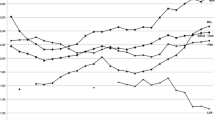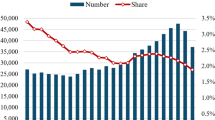Conclusion
I began with the hypothesis that the scientific productivity of a small country is promoted by the integration of research activities into the international scientific community. Integration occurs both individually and institutionally. The integration of individual research workers into the informal international movement of knowledge about problems, techniques and sharing in a particular branch of science, stimulates them and offers them a better chance of recognition by competent peers for their contributions to science. It thereby strengthens their incentive to exert themselves to the utmost in research. Institutional integration as the modelling of institutional arrangements in the small country on foreign academic organisation also increases productivity. In these ways, small countries can avoid being shunted to the periphery of world science.
Similar content being viewed by others
Rights and permissions
About this article
Cite this article
Schøtt, T. Scientific productivity and international integration of small countries: Mathematics in Denmark and Israel. Minerva 25, 3–20 (1987). https://doi.org/10.1007/BF01096853
Issue Date:
DOI: https://doi.org/10.1007/BF01096853




